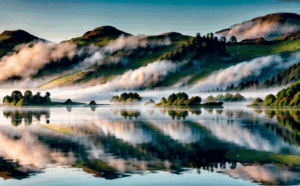The picturesque Loch Leven, a jewel of Perth and Kinross, is facing a delicate balancing act. The stunning beauty of its shores and the rich biodiversity of the surrounding area have attracted increasing numbers of visitors, leading to environmental challenges. A recent surge in informal camping has raised significant concerns among conservationists and local residents alike.
The uncontrolled influx of campers has resulted in a range of problems. Litter and human waste are accumulating, negatively impacting the delicate ecosystem and the overall aesthetic appeal of the area. Damage to the native vegetation is also evident, further threatening the habitat of numerous species. Protecting a Precious Ecosystem
Loch Leven is more than just a scenic spot; it holds significant ecological importance. Designated as a Site of Special Scientific Interest and a Special Protection Area, its conservation is vital for preserving Scotland’s natural heritage. The area’s unique flora and fauna require careful protection from excessive human activity. This includes considering the impact on migratory birds and other wildlife that rely on this habitat for survival.
Local authorities and conservation groups are exploring strategies to mitigate the environmental impact while ensuring continued access for responsible visitors. One proposed solution involves implementing restrictions on overnight parking in designated areas during peak season. This approach aims to reduce the number of informal campsites and the associated environmental damage. Community Collaboration for a Sustainable Future
The challenges facing Loch Leven require a collaborative approach. Local residents, tourism businesses, and environmental organizations are actively engaging in discussions to find the best solution. The community understands the need to balance the economic benefits of tourism with the long-term environmental sustainability of the Loch and its surroundings. Open dialogue and cooperation are key to ensuring the preservation of this precious resource.
In addition to potential parking restrictions, other measures under consideration include educational campaigns to promote responsible visitor behavior. This includes highlighting the importance of ‘Leave No Trace’ principles and providing clear guidelines on appropriate camping practices. Increased waste management infrastructure and improved signage could also contribute to a cleaner and more sustainable environment. The local council is exploring the creation of designated camping areas with proper facilities to manage the influx of visitors responsibly. A Path Forward for Loch Leven
The future of Loch Leven relies on a delicate balance between protecting its natural beauty and supporting responsible tourism. The proposed management strategies aim to safeguard this vital ecosystem while ensuring the area remains accessible and enjoyable for visitors. By working together, the community can ensure that this cherished landmark continues to thrive for generations to come. The focus will be on creating a sustainable approach that respects both the natural environment and the needs of visitors, ensuring that Loch Leven’s beauty remains unspoiled while providing opportunities for responsible enjoyment.
The long-term plan includes continued monitoring of the area’s environmental health and regular assessments of the effectiveness of the chosen strategies. Local businesses are also crucial to this process, being key stakeholders in the sustainable development of the Loch Leven area. They are encouraged to participate actively in promoting responsible tourism and environmental conservation efforts.
The beauty of Loch Leven, with its historical significance and rich biodiversity, is a vital part of Perth and Kinross’s identity. By implementing well-considered and collaborative strategies, the community can ensure that this natural treasure continues to flourish for many years to come, offering a lasting legacy of conservation and responsible enjoyment for future generations. This includes considering the impact on local businesses that rely on tourism and finding solutions that promote both economic stability and environmental protection.
Beyond the immediate concerns, the broader implications extend to other similar areas within Perth and Kinross. The lessons learned and the strategies developed for Loch Leven will provide a valuable framework for managing visitor pressures in other sensitive natural spaces. This holistic approach to environmental conservation and responsible tourism will contribute to the sustainable development of the whole region. Such initiatives reinforce the strong sense of community engagement prevalent in Perth and Kinross, fostering shared responsibility in the preservation of local heritage.
The uncontrolled influx of campers has resulted in a range of problems. Litter and human waste are accumulating, negatively impacting the delicate ecosystem and the overall aesthetic appeal of the area. Damage to the native vegetation is also evident, further threatening the habitat of numerous species. Protecting a Precious Ecosystem
Loch Leven is more than just a scenic spot; it holds significant ecological importance. Designated as a Site of Special Scientific Interest and a Special Protection Area, its conservation is vital for preserving Scotland’s natural heritage. The area’s unique flora and fauna require careful protection from excessive human activity. This includes considering the impact on migratory birds and other wildlife that rely on this habitat for survival.
Local authorities and conservation groups are exploring strategies to mitigate the environmental impact while ensuring continued access for responsible visitors. One proposed solution involves implementing restrictions on overnight parking in designated areas during peak season. This approach aims to reduce the number of informal campsites and the associated environmental damage. Community Collaboration for a Sustainable Future
The challenges facing Loch Leven require a collaborative approach. Local residents, tourism businesses, and environmental organizations are actively engaging in discussions to find the best solution. The community understands the need to balance the economic benefits of tourism with the long-term environmental sustainability of the Loch and its surroundings. Open dialogue and cooperation are key to ensuring the preservation of this precious resource.
In addition to potential parking restrictions, other measures under consideration include educational campaigns to promote responsible visitor behavior. This includes highlighting the importance of ‘Leave No Trace’ principles and providing clear guidelines on appropriate camping practices. Increased waste management infrastructure and improved signage could also contribute to a cleaner and more sustainable environment. The local council is exploring the creation of designated camping areas with proper facilities to manage the influx of visitors responsibly. A Path Forward for Loch Leven
The future of Loch Leven relies on a delicate balance between protecting its natural beauty and supporting responsible tourism. The proposed management strategies aim to safeguard this vital ecosystem while ensuring the area remains accessible and enjoyable for visitors. By working together, the community can ensure that this cherished landmark continues to thrive for generations to come. The focus will be on creating a sustainable approach that respects both the natural environment and the needs of visitors, ensuring that Loch Leven’s beauty remains unspoiled while providing opportunities for responsible enjoyment.
The long-term plan includes continued monitoring of the area’s environmental health and regular assessments of the effectiveness of the chosen strategies. Local businesses are also crucial to this process, being key stakeholders in the sustainable development of the Loch Leven area. They are encouraged to participate actively in promoting responsible tourism and environmental conservation efforts.
The beauty of Loch Leven, with its historical significance and rich biodiversity, is a vital part of Perth and Kinross’s identity. By implementing well-considered and collaborative strategies, the community can ensure that this natural treasure continues to flourish for many years to come, offering a lasting legacy of conservation and responsible enjoyment for future generations. This includes considering the impact on local businesses that rely on tourism and finding solutions that promote both economic stability and environmental protection.
Beyond the immediate concerns, the broader implications extend to other similar areas within Perth and Kinross. The lessons learned and the strategies developed for Loch Leven will provide a valuable framework for managing visitor pressures in other sensitive natural spaces. This holistic approach to environmental conservation and responsible tourism will contribute to the sustainable development of the whole region. Such initiatives reinforce the strong sense of community engagement prevalent in Perth and Kinross, fostering shared responsibility in the preservation of local heritage.


